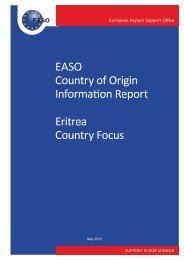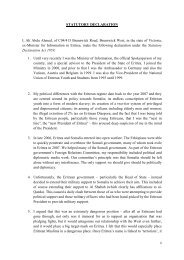o94lwpv
o94lwpv
o94lwpv
Create successful ePaper yourself
Turn your PDF publications into a flip-book with our unique Google optimized e-Paper software.
Ferede and Ofosu-Mensah 050<br />
the post-colonial period, due to the absence of absolute<br />
agency, the ghosts of colonialism continues to haunt the<br />
march back to the pre-colonial past whereby the society<br />
moves without strict confinement as the rivers do.<br />
CONCLUSION<br />
It is the dependence on the territory and euro centric<br />
westphalian model of state that blurred discussions about<br />
interconnections and shared values between the Trans<br />
Mereb brothers of Eritrea and Ethiopia. Thus, the<br />
contentious debate and state of confusion perused by the<br />
Ethiopianist and Eritrean nationalist is basically crafted by<br />
the colonialist state engineering and the concomitant<br />
intellectual dependency of both schools of thought on<br />
such premises. Therefore, the beginning of colonial rule<br />
that procures a foothold in Assab under the guise of<br />
missionary service has created a historic divide line<br />
which is later complicated with the internal contention for<br />
the control of the political power. The failure of the<br />
peoples both North and South of the Mereb to defend this<br />
imperialist conquest of Italy generated paradoxes on the<br />
Ethiopianist‟s assertion of the Ethiopianness of Eritreans<br />
and as well the none-colonized sovereign history of<br />
Ethiopia.<br />
Though the remedial theorists attribute the separatist<br />
movement to the dissolution of the federal act, in actual<br />
fact it was a year before the dissolution of the federation<br />
that the Eritrean independence movement was formed.<br />
Thus, the author contends that instead of the dissolution<br />
of the federation, the indifference of the leaders and the<br />
peoples residing south of the Mereb during the Italian<br />
occupation of Mereb Melash as a colonial protectorate<br />
primarily triggers the separatist mindset which later on<br />
manifested as an armed insurrection. Hence, the<br />
dissolution of the federal act served as an excuse for the<br />
onset of the practical phase of the separatist insurgency.<br />
The ferment of insurgency was burning inside waiting<br />
only favorable time to burst out. Thus, to realize the<br />
aspiration of Eritreans for self-determination, the<br />
separatist movement broke out on the wake of the<br />
complete denial of self-rule and autonomy. The struggle<br />
to secure such right itself has also created a riff and<br />
thereof for the birth of distinctive identity tainted with the<br />
blood of the martyrs. However, today there is a debate on<br />
the legality of the birth of Eritrea as an independent<br />
sovereign state. This contentious debate and state of<br />
confusion is basically crafted by the colonialist state<br />
engineering and the concomitant intellectual dependency<br />
of both schools of thought. It is the mind colonization<br />
which is the legacy of western European imperialism that<br />
had divided the brothers of the horn into divergent<br />
historiography at the very origin and of course the<br />
concomitant endogenous less accommodative mind set.<br />
in Ali J. Ahmed (ed.), The Invention of Somali.<br />
Lawvence Ville, the Red Sea Press.<br />
Alemseged A (1998). Identity Jilted or Re-Imagining<br />
Identity. The divergent Paths of the Eritrean and<br />
Tigrayan Nationalist Struggles. Lawrenceville, Red Sea<br />
Press.<br />
Araya T (1988). The History of Eritrean Struggle: in Lionel<br />
Cliff and Basil Davidson (eds), The Long Struggles of<br />
Eritrea Independence and Constructive Peace.<br />
England-Nottingham.<br />
Bahru Z (2002). A History of Modern Ethiopia, 1855-1991<br />
2nd ed. James Currey-Oxford-Ohio University Press:<br />
Athens-Addis Ababa University Press, Addis Ababa.<br />
Bahru Z (2008), Society State and History: Selected<br />
Essays: Addis Ababa University Press.<br />
Bailey G.A (1994). “Rebirth of the Non-Western World.”<br />
Anthropology Newsletter 35(9)<br />
Bereket H (1986). Eritrea and the United Nations.<br />
Trenton, New Jersey, the Red Sea Press.<br />
Clapham C (2000). War and State Formation in Ethiopia<br />
and Eritrea. England: the Global Site, University of<br />
Sussex, Brighton.<br />
Cocodia J (2008). “Exhuming Trends in Ethnic Conflict<br />
and Cooperation in Africa: Some Selected States.” In<br />
Afri. J. Conflict Resolution, Vol.8 No.3:910-930.<br />
Gilbert G (1962). The Rise and fall of the Eritrea–Ethiopia<br />
Federation: 1941-1962. Foreign Service Institute.<br />
Negussay Ayele(2000), In Search of the Historical DNA of<br />
the Eritrean Problem, Review Article on The Eritrean<br />
Affair (1941-1963) by Ambassador ZewdeRetta<br />
accessed<br />
athttp://www.ethiopians.com/NA_Review_EritreanAffair<br />
_ZR.htm<br />
Ottaway M (1982). Soviet and American Influence in the<br />
Horn of Africa: J. Stud. Influence Int. Relations, Praeger<br />
Special Studies<br />
Okwudiba N(1998). Ethnic Conflicts in Africa. Nottingham:<br />
Council for the Development of Social Science<br />
Research in Africa (CODESRIA)<br />
Othman SS (1974). The History of Eritrea. Lebanon,<br />
Beirut: Dar-al-Masirah<br />
Semere H (1988). Historical Background to Ethiopia-<br />
Eritrea Conflict: in Lionel Cliff and Basil Davidson<br />
(eds.), The Long Struggles of Eritrean Independence<br />
and Constructive Peace. England: Nottingham<br />
Suberu RT (2003). Ethnic Minority Conflicts and<br />
Governance in Nigeria. Lagos: Spectrum Books Ltd.<br />
Takeste N (1997). Ethiopia and Eritrea: The Federal<br />
Experience. Uppsala University Press.<br />
Trevaski G (1960). Eritrea: A Colony in Transition.<br />
London: Oxford University Press.<br />
Yohannes O (1988). Eritrea a Pawn in World Politics.<br />
Gainesulle: University of Florida Press.<br />
BIBLIOGRAPHY<br />
Abdalla O (1995). The Nature of the Somali Clan System,






